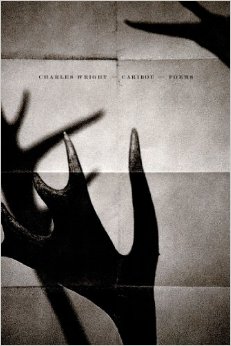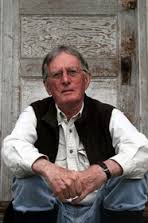I started reading Charles Wright’s new collection of poems, Caribou, and immediately was reminded of something that happened 20 years ago.
I was on the board of the World Bird Sanctuary, an organization on the preservation of raptors (birds like hawks, falcons, great horned owls, and eagles). We met monthly at different locations. One month we met at the ranger’s station at Lone Elk County Park in far western St. Louis County.

I froze in place, not knowing what to do, until the ranger’s car appeared on the road and I could see by his headlights. I was in the middle of the elk herd, which liked to come down to the station at night to sleep. Some were already asleep; others were standing on the sidewalk, blocking the way to my car. The park, by the way, was misnamed. There was no lone elk; there was actually a herd of about 100 elk.
With the light of the ranger’s car, I carefully made my way through the herd. If you’ve never seen one, adult elk are big, like horses, and I was meandering my way through them. Carefully. And smiling. “Nice elk. Good elk. Just let me get to my car and you can go back to sleep.” They gave me a rather bored eye as I made my escape.
Caribou, which we often call reindeer, are in the same family as moose, deer, and my herd of elk (or wapiti). Caribou have mostly vanished south of the Canadian border, but they are still to be found in Canada.
No poem in the collection bears the title “Caribou, ” but it’s a fitting title nonetheless. These poems are about memory, what has passed, and what is gone, perhaps like the caribou gone from southern North America, memories all enclosed with descriptions and metaphors of nature.
These are the poems of old age, expressing few regrets except for friends now gone, reflecting on what has been. And even more are the poems imagining the end-times, because for the individual, end-times in this world come with the individual’s death.
Here’s “Shadow and Smoke”:
Shadow and Smoke
Live your life as though you were already dead,
Che Guevara declared.
Okay, let’s see how that works.
Not much difference, as far as I can see,
the earth the same paradise
It’s always wanted to be,
Heaven as far away as before,
The clouds the same old movable gates since time began.
There is no circle, there is no sentiment to be broken.
There are only the songs of young men,
and the songs of old men,
Hoping for something elsewise.
Disabuse of them in their ignorance,
Lord,
tell them the shadows are already gone, the smokes
Already cleared,
Tell them that light is never a metaphor.
What does Wright say in these poems? That as we age, we realize life is less about what we achieve and do and more about who we are. That the answers to fundamental questions don’t become clearer but that accepting that the answers may not be understood becomes easier. That we will find ourselves listening more and talking less. That we owe a debt to those who came before us that we can never repay.
That perhaps life is really about acceptance, and we won’t realize that until the end.
Lullaby
I’ve said what I had to say
As melodiously as it was given to me.
I’ve said what I had to say
As far down as I could go.
I’ve been everywhere
I’ve wanted to but Jerusalem,
Which doesn’t exist, so I guess it’s time to depart,
Time to go,
Time to meet those you’ve never met,
time to say goodnight.
Grant us silence, grant us no reply,
Grant us shadows and their cohorts
stealth across the sky.

I consider my herd of elk again. How much of life is stepping into the darkness, sensing the presence of something large and incomprehensible, without any light to explain or make sense of it? That is, until a glimmer comes, and allows you to walk through the darkness. That’s what Charles Wright says in Caribou.
Image by Hiroyuki Takeda. Sourced via Flickr. Post by Glynn Young, author of the novels Dancing Priest and A Light Shining, and the just-published Poetry at Work (T. S. Poetry Press).
__________________
Want to brighten your morning coffee?
Subscribe to Every Day Poems and find some beauty in your inbox.
- Longfellow’s “Paul Revere’s Ride”: Creating a National Legend - April 17, 2025
- Poets and Poems: Katie Kalisz and “Flu Season” - April 15, 2025
- Poets and Poems: Michelle Ortega and “When You Ask Me, Why Paris?” - April 10, 2025

Martha Orlando says
I’m counting on that glimmer to see me through . . .
Blessings, Glynn!
Mary Sayler says
Thanks, Glynn, for letting us know about Charles’ new book. I’ve followed his work for years, so most of his poetry books eventually find their way onto my bookshelves. Besides the fact that Wright’s poems are probably the most exquisite being written today, I’m always eager to see how his spiritual search is going. He started tightly in a church pew but seems to be looking and looking for something that’s right there, and I keep hoping he’ll jump back into a strong faith – even without it – and let God do the rest to give spiritual rest. May the Grace of God be with you, Charles, as awesome as the grace of your beautiful, beautiful words. Thanks, Glynn.
Maureen Doallas says
Wonderful post about a marvelous poet.
Laurie Flanigan says
I love this Glynn. Thank you for sharing it.
Sandra Heska King says
Another new poet to me.
I can hardly believe my
shelves are filling up with poetry.
Look! A Poem. 😉
I laughed out loud at your elk story. My hometown maintains an elk herd on over 100 acres. It started out with three when a local nature center closed, and now there are about 70. They’re fun to watch. You’d be able to add them to your bike-riding wildlife report because another 100 acres of park trails (hiking/biking/cross-country ski) share the boundary. But if you go to the right place and know the right people, a few will come up to the fence to eat out of your hand. 🙂
Divya Sachdeva says
Thanks for sharing this. I believe this April is turning out be a wonderful month where i have known so many new poets. Wislawa Szymborska , Tomas Transtromer and others. That I decided to find a new poet this week and study their poetry.
XX Gratitude XX,
I Love tweetspeakpoetry, most imp ingredient for creativity
SimplyDarlene says
This poetry makes me think of Johnny Cash.. this bit in particular:
“There is no circle, there is no sentiment to be broken.
There are only the songs of young men,
and the songs of old men.”
We have elk here. About 5-10 come each winter and bed down on our hillside. We’ve also had huge herds pass through, but I cannot imagine walking into their midst… “something large and alive.”
Megan Willome says
I love your last paragraph, Glynn. And I’ve been around enough elk in Colorado to be truly intimidated.